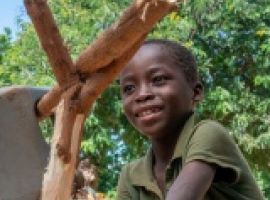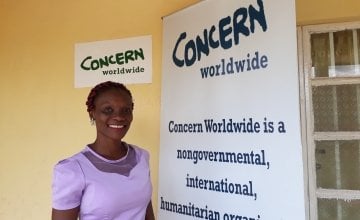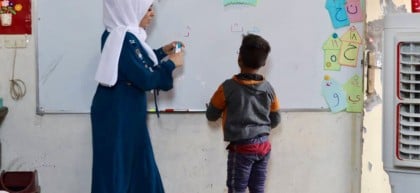
Read our 2022 annual report

Knowledge Hub
Marriage and harmful cultural practices: hear the voices of three women in Sierra Leone

To commemorate World Cultural Diversity for Dialogue and Development day, EU Aid Volunteer Carlos Velázquez worked to gain a better understanding of the most prominent cultural factors promoting or hindering women’s developments in Sierra Leone.
The following interviews allowed me to discover the stories of three incredibly strong individuals who, against all odds, have been able to prosper and succeed in life in Sierra Leone. I am deeply thankful to Fatmata, Ramathu and Mabrat for sharing their stories with me.
Meet Fatmata
Fatmata Sesay is 43 years old. Each morning, she enters my office and welcomes me in Krio - Sierra Leone’s most widely spoken language: “Aw di slip, sa? (How did you sleep?)”. I can always see a huge grin on her face when I use my rubbish Krio to reply: “Ar de slip fine, tenki” (I slept well, thank you). After our morning greetings, Fatmata proudly proceeds to do her job, which is looking after the Concern office.
Fatmata never went to school. “I lost my parents at an early age”, she explains. “Some people when they lose their family members do things that are not beneficial for themselves. When I lost my parents, I remembered what my grandmother used to tell me: be sober, be serious and keep working to earn a living”. That is what she did, all by herself. “Since I had no chance of getting an education, I went into business."
I started my first business when I was 15 years old selling butterscotch. At the age of 19, I got a small loan, went to Guinea, bought some things like clothes, slippers and earrings, and sold them in Freetown. I did this until I started to work with Concern in 2009."
Meet Ramathu
Ramathu Kadiatu is 33 years old. She was born in Makeni (Northern Sierra Leone), in a family of seven sisters and one brother. Ramathu cherishes her education as she feels it sets her apart from other women. “I am the only woman in my house who went to school. It is the best decision I ever made. I went to university and studied Economics”. After graduation, she started working for Concern as part of the Monitoring and Evaluation department.
Ramathu tells me that it is because of her education that she has become the strong woman that she is today: “I know how to organise my workload, I plan accordingly and never have to beg people for money”. Currently, she is fulfilling one of her dreams, which is having her own house:
I am building a four-bedroom house for me and my daughter with my income. My neighbours admire and praise me for my achievements. They see me as a female role model."
Meet Mabrat
Mabrat Abdulai is 32 years old and is immensely proud of what she has achieved as a woman. Mabrat works as the Learning and Knowledge Management officer at Concern and highlights that “women are capable of doing all that men do, if only they were given the chance to do so”. She values her job, which makes her financially independent.
However, the cultural tradition of having to take care of her extended family sets high expectations on her. Having to share her salary with her extended family additionally makes it hard for women to get to the top or feel financially secure. Mabrat stays positive, but admits;
Women struggle to exercise power in Sierra Leone, as men are always given more rights and the appropriate platforms to do so."
The influence of marriage
When asked about the most prominent cultural feature affecting women’s development in Sierra Leone, all three women gave the same answer: the strong influence of marriage. Whilst having different opinions towards marriage, they all agree that Sierra Leonean culture expects all women to get married to a man and to form a family.
When Fatmata met her first husband, she was very young. “He was an educated man, whom I thought would be supportive, so I became pregnant at the age of 21. He soon after started showing an aggressive attitude that I did not like. I took some time to reflect and made up my mind. I needed to break up with him; if I stayed with him, he would misuse my life. This was a hard moment. I was 21 years old, seven-months pregnant, had lost my mother and felt I had no family to support me. My friends told me to stay with this man, that I had no other choice but I did have a choice: I ended the relationship”.
Whilst I was still pregnant, I learned how to do braids for women and started earning a living. If I had listened to my friends and followed what my culture dictates, I might not even be here today."
After Fatmata gave birth, she met the man who is now her husband. “We have been together for 23 years, he is also a businessman so he understood that I must work to earn a living and he does not mind that. Some men in Sierra Leone don’t like it if their wives work but he has always been supportive”.
The culture of marriage as the only path for women has also taken a toll on Ramathu’s life: “I met this man who said he wanted to marry me and I liked him. He told me that in order to prove my love to him; I had to give him a child.
I soon after became pregnant and it was only then that he told me that he was abandoning me because he was not ready to be a father nor to marry me."
He pushed me to abort the child but I did not because, in my opinion, one of the most important gifts that God gives to women is the ability to bear a child. Being pregnant meant a lot to me and it was one of my proudest moments as a woman. Taking care of my daughter and being able to see her go to school makes me very happy”.
According to Ramathu, “every woman’s dream in Sierra Leone is to find a man and get married”. She thinks that this cultural aspect “could be holding women’s development back”. Religious leaders “tell us that the only path for women is to marry a man, to give birth and to take care of her husband. I am a Muslim and I go to the Mosque but I find the issue of marriage very stressful. Some of us have followed a different path. In my case, I am not married and I have a kid. They talk about me at the mosque and it can be very stressful; it puts too much pressure on women”. At 33, Ramathu would still like to marry but “it is very difficult for a woman of a certain age to find a man”. Even if she likes a man, she cannot approach him.
Culturally, it’s a taboo for women to take the first step. If the man does not want you, then he can use the fact that you approached him in the first place to discriminate you. It’s shameful."
Mabrat, on the other hand, is proud of her culture in regards to marriage. “I am happy that we are religiously and tribally tolerant which allows inter-religious and ethnic marriages between two people. Some families do a background check of the family the man is coming from, before they allow their daughter to marry the man. This protects many women because we believe that the way a father treats the mother is how the son will treat the future wife".
Harmful cultural practices
Fatmata struggles to find aspects of her culture that promotes women’s development: “As I was growing up, I wanted to like my culture but as I became an adult, I realised that there were so many things oppressing women that made it hard to like my own culture.
The worse cultural practice is Bondo or the initiation of girls into adulthood. They take the girls into the bush and they cut their clitoris."
This practice is very popular here as many people think it will reduce promiscuity among women. I think this practice is cruel and has no benefit to anyone, I will never ask my daughter to go through with it”.
For Mabrat, female genital mutilation is the cruellest cultural practice in Sierra Leone. “Female genital mutilation is holding women back and it is simply about controlling women’s sexuality and freedom. On top of that, we need to overthrow some traditional mind-sets that forbid married women to move freely, go to clubs, speak in public places, restrict our way of dressing and even ban us from inheriting property from our parents”.
Women run this country
“Let me tell you about women in Sierra Leone”, concludes Fatmata. “We are strong. We are the strongest people you will ever meet. Some of the things that women undergo here I cannot even tell you, because they are so hard to share.
You must know one thing - women run this country."
Many work restlessly to pay the house rent, the food and the school fees. On top of that, they have to take care of the house chores, the husband and the kids. This is why women die very young in Sierra Leone. They burn out.
No one recognises the work that women do. The praise will always go to the man. The neighbours will say ‘oh, you are doing well… you have a good husband’. However, this is not true; they are not doing the job. Some men contribute small amounts to the household, but without women, they are lost.


